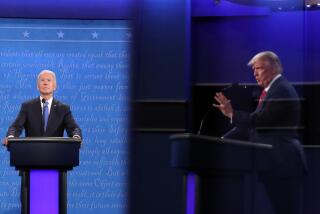BUSINESS PULSE / JOHN BRENNAN : Voters Don’t Buy Expert Wisdom That Economy’s Perking Along
- Share via
Political pundits look for revolution in each election. Searching through the rubble voters leave behind, they desperately seek the harbingers of a future that cannot be seen. One election cannot predict the next.
With that disclaimer given, this reporter will now proceed to add his examination of the entrails to the pile.
Some see this election as a permanent sharp rightward swerve on the public’s part. But what happened is more complex. Unlike their counterparts in Europe and Canada, Americans stay pretty centrist when it comes to economic and social policies. Except when pocketbooks really hurt, as in 1992, a host of things affect elections, and a relatively small swing of feelings can produce a riptide of change. That’s why Minnesota, quizzically, puts a right-winger like Rod Grams in the Senate alongside a liberal like Paul Wellstone. And Californians reelect Pete Wilson and Dianne Feinstein in the same stroke.
The fact is, there is no philosophical consensus in this country about what government’s role should be. Americans are of two minds on the subject. Even during the Ronald Reagan years, they never lost faith in the basic New Deal credo that Washington should intervene to help people. The public rejected the trickle-down economics that President Reagan espoused, liking him in spite of, not because of, those utterances. And even the most conservative Californian becomes a fan of federal spending on the morning after an earthquake.
This October, as the Republican blowout was brewing, 61% still told The Times Poll that spending for domestic programs should be increased . Most, including GOP-leaning voters, had never heard of the now-legendary Republican Contract with America. When told it was a mix of tax cuts, more defense spending and a balanced budget amendment, a majority called it “unrealistic.”
*
Why, then, did the Republicans win?
Well, if voters still think government should help people, they also feel it’s doing a lousy job in that regard. The public thinks Washington wastes tax money and gives it to all the wrong people--welfare cheats, illegal immigrants and convicts watching color TV in prison. These sentiments also wax and wane, but when they get strong, things tilt the GOP’s way.
Such a swing against activist government occurred this year. In 1992, 49% of voters in the TV network exit poll said the government should generally be doing more to help people; 41% felt it was doing too much. This year, the proportion calling government’s influence excessive climbed to 56%, while the share wanting it to see it do more dropped to 41%.
One of the reasons people are angry at Washington is clear: They are terribly disappointed with President Clinton. He entered this midterm battle with the lowest job ratings of any recent President, below even Jimmy Carter.
There are many reasons for Clinton’s unpopularity--misgivings about his character and ideology in particular. But scandals and gays in the military are not Clinton’s top problems. He is dogged by what has plagued troubled Presidents since Martin Van Buren: a bad economy.
Voters simply don’t buy the experts’ wisdom that the economy is perking along. In 1992, 79% told exit pollsters it was in bad shape, and 62% of them voted Democratic for Congress. This year, 57% still felt the economy was in the outhouse. Once again, those voters turned on the party in power, casting the same 62% for the GOP outsiders.
The message of an economic rebound is just not getting through. Some 43% of voters said they’re working harder and earning less these days, and three-quarters said their personal finances are no better than two years ago. Prominent among these malcontents are Ross Perot backers--largely blue-collar men who took out their wrath on George Bush in 1992. No happier now, they transferred their anger to Clinton this year. But they have no particular affection for either party and are driven by sheer disappointment more than anything specific.
Those feelings pose a mighty challenge to whoever is in power. Americans don’t only want government off their backs, they want it to work better and to make them feel better about their own lives. Surprisingly, despite the anti-government mood, voters still tell pollsters they want Congress to act on health care reform--yes, health care reform . Not the Clintonian mega-program, perhaps, but something.
So Speaker of the House-to-be Newt Gingrich and Senate Majority Leader-in-waiting Bob Dole beware. It will take more than a balanced budget amendment to hold these people in your tent.
More to Read
Get the L.A. Times Politics newsletter
Deeply reported insights into legislation, politics and policy from Sacramento, Washington and beyond. In your inbox twice per week.
You may occasionally receive promotional content from the Los Angeles Times.










